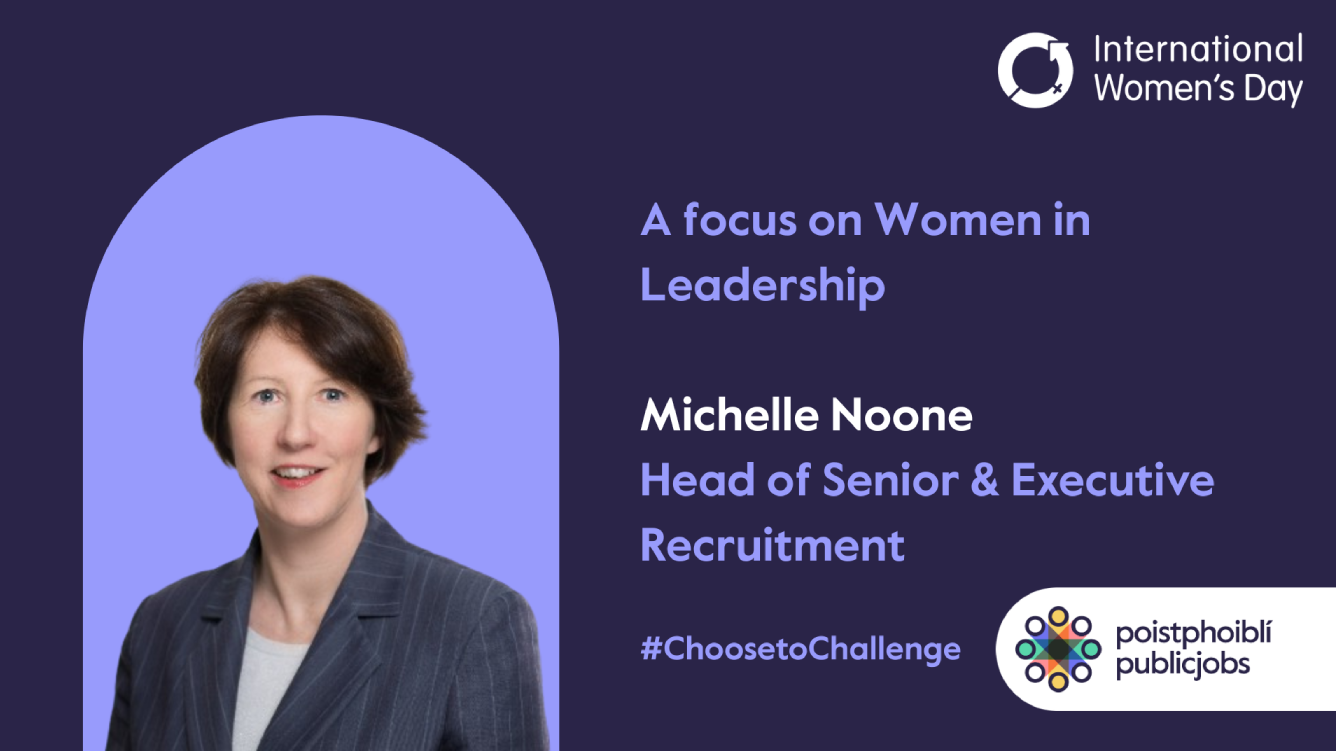
On International Women's Day, we celebrate the achievements of women and highlight the importance of equality in leadership to create positive and productive work environments. We caught up with some of our successful women in leadership roles at publicjobs who share their personal experiences in their careers and offer advice and inspiration to others to help them build fulfilling careers.
Michelle Noone, Head of Senior & Executive Recruitment at publicjobs
1. This year's International Women's Day theme is Choose to Challenge. From your perspective, what are the benefits of choosing to challenge?
We can all choose to challenge and call out gender bias and inequality. This is particularly important not only in our personal life but most importantly in our working lives, at work with colleagues, working with clients to find solutions, defining processes in particular in recruitment. Commitment to choose to challenge inequality, call out bias, question stereotypes, and help forge an inclusive world.
2. What would you say to women considering a career in the public and civil service?
The great thing about working in the public and civil service, no matter how small your role, you are a part of the delivery of services that contribute to the overall economic and environmental aspects of Irish life. Nowhere is this more evident than during the current context where our health sector and financial supports have stepped up to the challenges of the pandemic. For me, it is a great honour to be part of this story. In addition, there are a lot of great supports in place, flexible work options, wellbeing supports.
3. What's the best piece of leadership advice you were ever given?
I got several pieces of advice throughout my career but the best advice was to lead by example – don't do anything you would not do yourself. Although I never met Eleanor Roosevelt, I always loved her quote: 'What would we accomplish if we knew we would never fail'.
4. What do you think is the biggest issue facing women and their careers today?
The biggest issue facing women is always trying to be 'superwoman'. We often look at women who we see as successful and wonder how they can do it 'all', work, family, hobbies, Committees, cooking, etc. The truth is no one can do it 'all'. The women who are most successful know this and focus on what is important for them. Today the biggest issue facing women may be the return to a hybrid working environment post-pandemic. This may challenge our work-life balances in ways that we have not anticipated, for example being always on and working late hours.
5. In your opinion, why is it important that more women take up careers in sectors where they are currently underrepresented?
Research shows that women have a meaningful impact on a company's culture, more likely to embrace employee-friendly policies and programmes and champion racial and gender diversity, more likely to mentor and sponsor employees, particularly women. Company profits and performance can be 50% higher when women are well represented across sectors at a senior level.
6. What barriers have you faced in becoming successful in your field and how did you overcome them?
I worked for 20 years in a sector that was predominantly led by male consultants. I always thought this was unusual given the skills required to engage and attract talent for clients. For a while, working with two excellent consultants, I found it difficult to have my voice heard at the table. Often at a meeting with a 'male' CEO / Director, as the only female in the room, you really had to speak up and remind them you were present and not there to eat the biscuits which were pushed towards me at the meeting.
7. Which female leaders inspire you and why?
I have been inspired by many women throughout my career. I have had both male and female bosses over the years who have inspired me. The women who have most inspired me are:
Mo Mowlam, former Secretary of State in Northern Ireland, had a unique style, an issue-based perspective, and an inclusivity focus which all worked together to ensure her vital contribution to Northern Irish history.
Norah Patten, is a Citizen Scientist-Astronaut Candidate with Project PoSSUM (Polar Suborbital Science in the Upper Mesosphere) and has participated in several citizen science campaigns including microgravity research flights, spacesuit testing and evaluation, hypoxia and sea survival training, aviation and spacecraft egress, and high-g flights. In 2018, Norah was awarded the PoSSUM Science Educator Award for her work in using the unique opportunities at PoSSUM to inspire, educate, and engage young students throughout Ireland, an emerging space nation.
Ann Derwin, Ambassador to China & Mongolia, who started life as a veterinary surgeon, joined the Department of Agriculture and became an Economist and subsequently Assistant Secretary. She then moved to the Department of Foreign Affairs as Assistant Secretary, Corporate Services.
8. What important message would you share with young women thinking about their future careers?
Find a job you are passionate about, don't stop learning, be adaptable and embrace change. Just do it.
